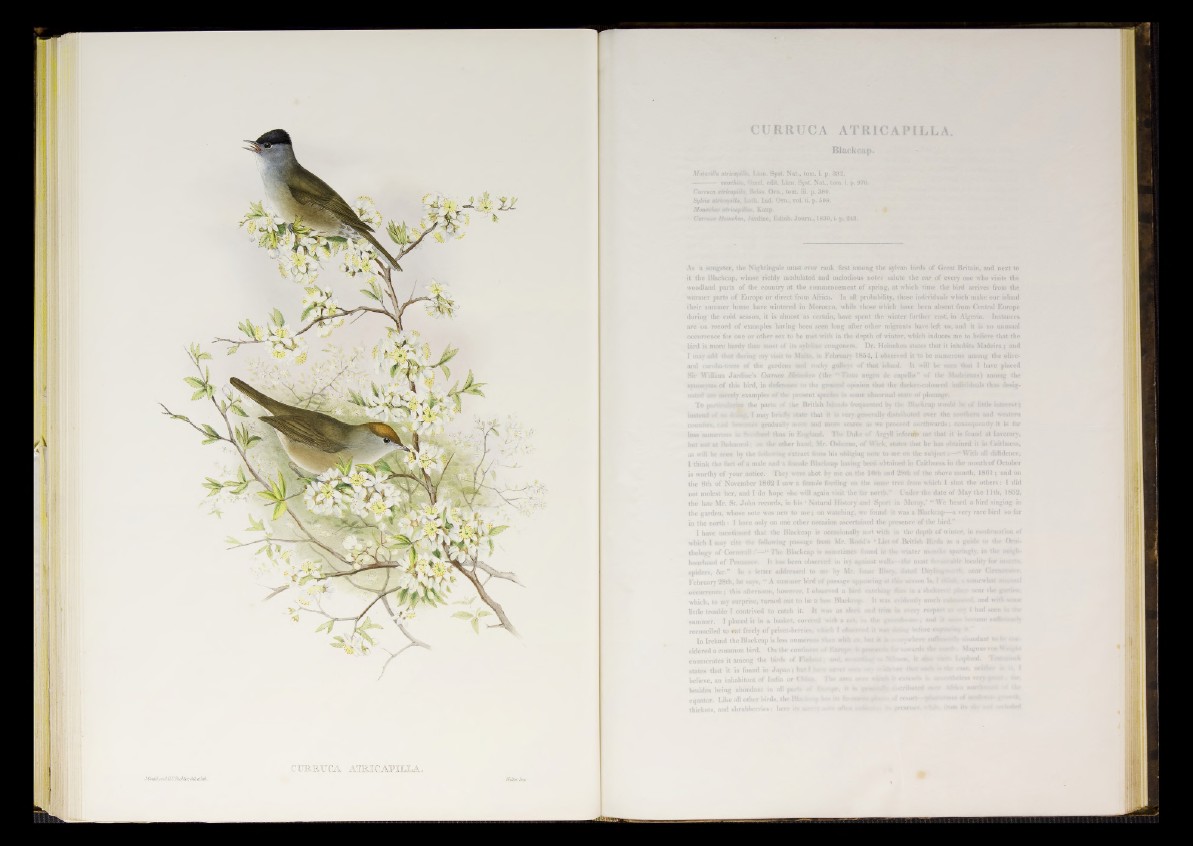
J . Ceñid and flC Rtchtrr del it Mi
C U R R U C A A T R I C A P I U L A .
Waller, imp
Blackcap.
MolaeiBa atricapffla, Linn. Syst. Nat., tom. i. p. 332.
—- moschiln, Gote!, edit. Lmn. Syst. Nat., tom. i. p. 970.
Curruca atrieapUh, ftriss. Orn., tom. lii. p. 380.
Sylvia oi«V ipi7/rt, U th . Ind. Om., vol. ü. p. 608.
Monaehm atricapilku, Kaup.
■ Cttrrnea fieineken, Jardine, Edinb. Journ., 1830, i. p. 243.
As a songster, the Nightingale must ever rank first among the sylvan birds of Great Britain, and next to
it the Blackcap, whose richly modulated and melodious notes salute the ear o f every one who visits thè
woodland parts o f the country at the commencement of spring, at which- time the bird arrives from the
-warmer parts of Europe or direct from Africa. In all probability, those individuals which make our island
their summer home have wintered in Morocco, while those which have been absent from Central Europe
during the cold season, it is almost as certain, have spent the winter further east, in Algeria. Instances
are on record o f examples having been seen long after other migrants have left us, and it is no unusual
occurrence for one or other sex to be met with in the depth of winter, which induces me to believe that the
bird is more hardy than most of its svivi ine congeners. Dr. Heinekcu states that it inhabits Madeira ; and
I may add that during inv visit to Malta, in February 1 8 5 4 ,1 observed it to be numerous among the olive-
and caroba-trees of the gardens ami rocky gullrv* o f that island. It will be seen that I have placed
Sir William Jardine's Curruca iSfeànefre* (the "T in to negro de capello' of the Madeirans) among the
synonyms o f this bird, in deference to the general opinion that the darker-coloured individuals thus designated
are merely examples o f the present species in some abnormal state of plumage.
To parrietdangt the parts of the British Islands frequented by tl»* Blackcap would he of little interest ;
instead ut m ; L?*si: I may briedy ¡state that it n very generally distributed over the «wtthero and western
counties, inti hMMNMffc gradually more and move scarce as we proceed northwards; consequently it is for
less numerous m a nipjs-d than in England. The Duke of Argyll infortite me that it is found at Iuveravv,
but not at Balmoral <*» the other hand. Mr. Osborne, of Wick, states that he has obtained it in Caithness,
'as will be see» by the foHowwig extract fim i his obliging note to me on the subject :— “ With all diffidence,
I think the fact of a male and a female Blackcap having' been obtained in Caithness, in the month o f October
is worthy of your notice. They were shot by me cm the 16tb and 28th of the above month, 1861 ; and on
the 8tli of November 1862 I saw a female feeding on the same tree from which I shot the others : I did
not molest ber, and I do hope she will again visit the for north." Under the date of May the 11th, 1852,
the late Mr. St. John records, in his 5 Natural History and Sport in Moray,’ “ We heard a bird singing in
the garden, whose note was new to me ; on watching, we found it was a Blackcap—a very rare bird so far
in the north : I have only on one other occasion ascertained the presence of the bird."
I have mentioned that the Blackcap is occasionally met with in the depth of winter, in confirmation of
which I may cite the following passage from Mr. Redd’s ‘ List of British Birds as a guide to the Orm-
thologv of Cornwall :*—“ The Blackcap is sometimes found in the winter month« sparingly, in the neighbourhood
of Petmmce. It has been observed in ivy against wail*—the most feivonraWe locality for iinterr«,
spiders, &c.” In a letter addressed to ose by Mr. Isaac IU#ey, dated Daytj»gwwx*k. near Cireawster,
February 28th, he say#, “ A summer bird of passage appearing a t rfm season is, 1 *ha*h. * somewhat tmusnal
occurrence ; this afternoon, however, I ohwrred a birci catching dies in a shelter. *; pfeso- near the garden,
which, to my surprise, turned out to be a hen Blackcap. It was evidently much < \h - - t and with
little trouble I contrived to catch it. It was as sice* .utd «ri» every respect a
summer. I placed it in a basket, covered with a net, »• the •• an<f it became saftrietMty
reconciled to eat freely of privet-bcrries, which I observed it wm dmag before raptor
In Ireland the Blackcap is less nuraenw« dtem with «:*. ‘wit H » rv where sulftetetrth abundant to he
sidered a common bird. On the contvMM* of Europe it '
enumerates it among the birds of 'FMtod ohI. aMOten
states th at it is found in Japan ; bat I bee* «ever • ; *
believe, an inhabitant of India or Ch&m The area o*w
besides being abundant in all par*# ••
equator. Like all other birds, the Hfch '
thickets, and shrubberries : here its -> • - ■